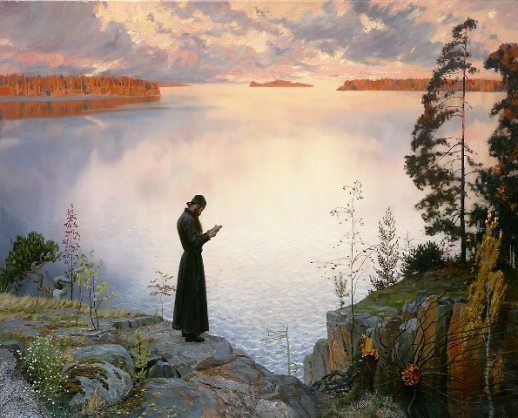 Yesterday in the bookstore I got a call from a lady about We Shall See Him As He Is: The Spiritual Autobiography of Elder Sophrony. Notwithstanding the facts that 1) she already owned the book and so was not looking to buy it, and 2) we don’t even publish that particular Sophrony book (it’s a St Herman of Alaska Brotherhood publication), she was in some distress and asked me to bear with her, and so I did. Basically, she had started reading the book and was worried about the trustworthiness of these seemingly extravagant claims of spiritual experience by a contemporary, uncanonized person. Her parish had been without a priest for months and she didn’t know who to talk to…and so she called us.
Yesterday in the bookstore I got a call from a lady about We Shall See Him As He Is: The Spiritual Autobiography of Elder Sophrony. Notwithstanding the facts that 1) she already owned the book and so was not looking to buy it, and 2) we don’t even publish that particular Sophrony book (it’s a St Herman of Alaska Brotherhood publication), she was in some distress and asked me to bear with her, and so I did. Basically, she had started reading the book and was worried about the trustworthiness of these seemingly extravagant claims of spiritual experience by a contemporary, uncanonized person. Her parish had been without a priest for months and she didn’t know who to talk to…and so she called us.
It was a slow day, so I gave her my two cents, with the explicit caveats that this was my personal opinion, I’ve never read the particular book, and I’m (obviously) not a priest. We ended up talking for about 20 minutes (far from the longest call I’d had even that week), and, thank God, it seems that my off-the-cuff answer was helpful. This conversation has left me thinking about the nature of religious experience in general, and what place it has (or ought to have) in the Christian life.
As with so much else, discernment is called for. We do not need to feel obliged accept every claim of religious experience or the miraculous as genuine; and, indeed, sometimes there may be good reason not to, if we are to know these things by their fruits. My godfather has said on more than one occasion that if an icon starts weeping, the first thing that should be done is an exorcism. Much spiritual literature makes the same basic point, that God will not hold our caution against us; Satan has appeared as an angel of light.
But, at the same time, to completely dismiss the very possibility of such things happening in our time and place would be tantamount to blasphemy. The God who reveals himself and works wonders doesn’t cease to do so just because we have gotten comfortable living in what Fr Stephen Freeman calls a two-storey universe. And, honestly, if you really believe in something so apparently absurd as the God who created the universe becoming a helpless infant, you have to acknowledge that anything is possible; where God wills, the order of nature is overturned.
Religious experiences or spiritual gifts, of whatever form that may take, should be received with thanksgiving, but we shouldn’t dwell on them too much, or set too much stock by them; there lies the way of delusion, whether of demonic origin or simple human pride. Even if you are convinced of a divine source of an experience, its meaning or message is often far from apparent. (Why is an icon weeping? Maybe Mary is crying over your sins, instead of just affirming your piety.)
These sorts of experiences can strengthen our faith, or act as signposts along the way; I have had some experiences that I can only call religious, and they have been significant to me. But they should never be an end in themselves, nor should we be overly troubled if we don’t have them. It’s easy for people to get excited by encountering things like weeping icons or clairvoyant elders, or to long for some deep mystical experience of the Uncreated Light; to some extent, that’s understandable, but none of these things are the point. As Paul says:
If I speak in the tongues of men and of angels, but have not love, I am a noisy gong or a clanging cymbal. And if I have prophetic powers, and understand all mysteries and all knowledge, and if I have all faith, so as to remove mountains, but have not love, I am nothing. (I Corinthians 13:1–2).